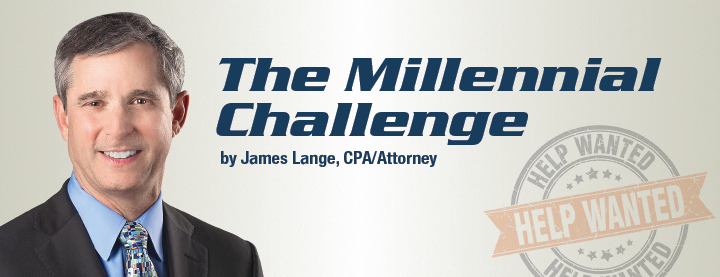Table of Contents
The Millennial Challenge
by James Lange, CPA/Attorney
Historically, our office has had very little employee turnover. Most of my employees have been here for decades. But as the company grows, we must find new people to fill the new positions. Frequently, I have been lucky to find people with years of experience under their belt, and a level of maturity that fits comfortably in our environment. But, some of my more adventurous forays into modern technology, social media, and new communication avenues, benefit from the expertise that many of the so called “millennial generation” are comfortable with. But recently, we lost our marketing director and an administrative assistant, both millennials. One left without notice.
Beginning the process of looking for replacement staff, I consulted with one of my “gurus.” The shocking recommendation I received was “don’t hire millennials.” He said, subject to exception of course, they feel entitled, don’t have a good work ethic, and that some of our other employees who are in their fifties and beyond will not take well to the entitled millennial with a bad work ethic. Naturally, this wasn’t a blanket statement about all people born in the decade after 1984, but it is a disturbing trend noted by others as well (more on that a bit later). But, he also noted that kids who grew up in a family business, preferably the restaurant business, were exceptions to the rule. (We can offer a data point on that observation–our most successful millennial employee, Eric Emerson, did grow up working in his family’s restaurant). I knew that about him when I hired him. Also, veterans don’t have those problems.
I fully realize that by bringing up this subject I can be accused of embracing a tradition that dates back to Socrates, and probably further: every generation worries that the next generation is missing critical skills and is overindulged.
-Attributed to Socrates by Plato (Source Not Provided)
But, as I mentioned above, my HR advisor is not the only one holding the opinion that millennials are challenging hires. Google “problems with millennials,” and you will get links to about 17 million opinions. That said, I am worried about the two-edged-sword effect of technology. While it improves aspects of our lives—health care especially—it is also undermining our face-to-face social interactions. And those interactions, among other things, build the critical relationships that can offer support, encouragement, and objective advice when things get a bit rough. Thinking about this topic led me to a YouTube video that went viral (FYI, that means a lot of people watched it—about 150,000): Simon Sinek on Millennials in the Workplace.
Simon Sinek, in his own words is an “unshakable optimist.” He is described as a “visionary thinker with a rare intellect.” Simon is a teacher and motivational speaker who is devoted to sharing his thinking to help other leaders and organizations inspire action. He believes the millennials have so many positive characteristics. They embrace tolerance, are idealists, respect creativity, and yearn to have a positive impact on society. But, he says that millennials share four characteristics that undermine the myriad positives that the generation embodies:
- Failed parenting
- Technology addiction
- Impatience
- A Failed Corporate Environment
With respect to number one, they suffered from over indulgent parenting. Being told they could do/be anything, getting medals for “effort,” earning places in AP classes because of parental influence not merit, etc. was supposed to build self-esteem. But, he argues, the generation has less self-esteem than the previous generation and it is oddly combined with an inflated sense of being “special.” Unfortunately, when they enter the workforce, they rather quickly learn that they are not so special, and when confronted with job issues, their confidence plummets. He mentions examples of conversations with millennials who land a job, work for a while, and then decide to quit because they don’t feel appreciated or they are not advancing quickly enough up the ranks.
Technology, in his opinion, has only exacerbated the problem. There is ample evidence that simple things like receiving a text, getting “likes” on Facebook, etc. release dopamine in the brain. Dopamine is a chemical that helps control the brain’s reward and pleasure centers. It is also tied to addiction. These young adults, who are having difficulty coping with stress, turn to social media for a quick fix—a dopamine boost. But, it is not effective. Many of them have not nurtured strong relationships that could help them in times of stress. Technology has become a bad crutch—close to a drug.
The third challenge they face is a high level of impatience. They are used to getting what they want when they want it—especially material things. And, going back to the parenting issue, many parents have stepped in on behalf of their child to remove an obstacle, or advance the child’s objective with their influence—that seriously distorts what it takes to accomplish something. Consequently, they have not learned that developing a satisfactory career and/or relationship takes time, energy, and tolerance for discomfort. Finding meaning and fulfillment in life is a long and challenging process—it is messy, and you will suffer setbacks.
Which brings us to number four: a failed corporate environment. Sinek, believes that businesses must begin to recognize the challenges of nurturing millennials into becoming stable members of the business community. Whether corporate America likes it or not, this responsibility cannot be ignored. Senior members of the community have been part of the problem (think back to number one), now they must be part of the solution. They need to provide mentors, they need to set limits on the use of technology in meetings and conference settings—no phones, no laptops. They need to encourage face-to-face collaborations. They need to provide adequate feedback that a new employee is in fact making progress toward advancing in their career—but that time needs to be put in and experience only comes with time.
Simon is hardly writing off this generation of millennials. And I am sure he would not say you should not hire them. But we should begin think about how we can improve the corporate environment to avail ourselves of the strengths of this generation and help them overcome some of their weaknesses. It will be in our best interest to do so!
By the way, if you know anyone who you think would be interested and a good fit for our company, we are currently hiring. Please refer them to www.paytaxeslater.com/careers to learn more. We will try to provide a good corporate environment.
Year-End Tax Planning and Lange’s Tax Planning Card
You may have noticed that you did not receive our traditional year-end tax letter, nor did you receive an updated hard copy of Lange’s Tax Planning Card. The reason you haven’t received these materials is because with the pending changes in the tax law, it would be premature for us to write something now or prepare the Tax Card. As of today, December 11, 2017 when I am writing this newsletter, both the House and the Senate have passed their version of tax reform and presumably the differences will be compromised into a final bill that would be signed by the President either before or after year end. On the other hand, predictions in today’s political climate are risky at best.
We will eventually do our updated Tax Planning Card when we know the new rates and will send you a hard copy. For the year-end tax letter, we will post it on our website as soon as we finish and you will be able to access it at www.paytaxeslater.com/yearendreport. If you want a hard copy of the report, please call Alice at 412-521-2732.
That said, assuming the proposed tax changes pass, or looks like it will pass after year-end, here are some year-end planning tips.
If you are currently itemizing your deductions, we would generally encourage you to pay them this year for three reasons.
- You may lose them because of the many itemized deductions that will no longer be deductible.
- There will be a higher standard deduction so even if they are still allowable, they might not do you any good.
- The tax rates might be lower.
If you are currently deducting miscellaneous itemized deductions, it would generally be advisable to pay them before year-end. That would also apply to fees that you would pay to your CPA and/or financial advisor. That would also include professional expenses employees incur, such as various expenses that college professors pay out of pocket related to their work. Certainly make charitable contributions before year’s end, particularly non-cash charitable contributions with low cost basis which will likely be lost due to the larger standard deductions in the future.
CAUTION: We are speaking in generalities, and it will be different for every taxpayer and we haven’t talked about the impact of Alternative Minimum Tax (AMT) which might offset some of the advantages that I’m talking about. Everybody really is a snowflake but I’m trying to give some guidance and some general principles that will help a lot, if not most, taxpayers.
Best wishes for a happy, healthy holiday season and best wishes for a great 2018.
Warmest personal regards,



